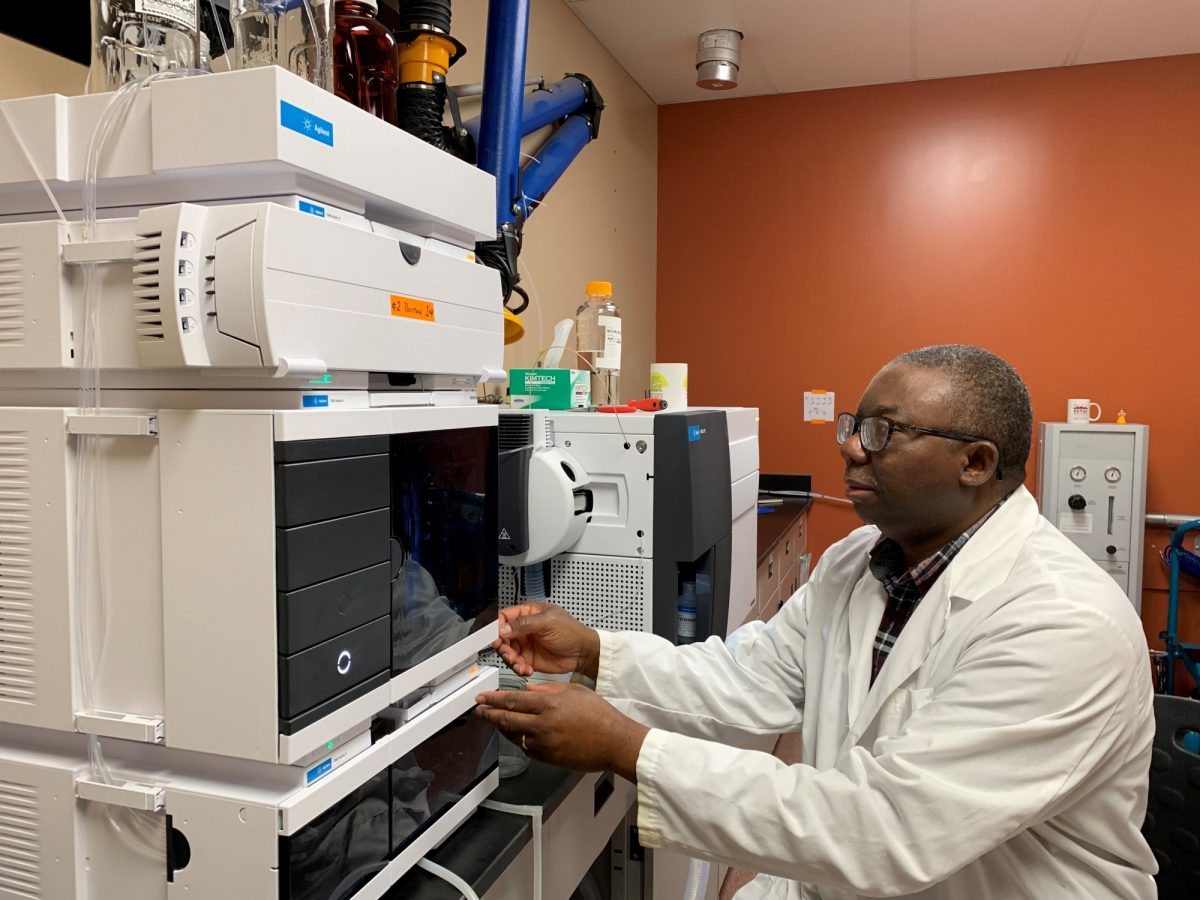
Meet Rotimi Aluko, Canada Research Chair in Bioactive Peptides
Rotimi Aluko, a professor in the Department of Food and Human Nutritional Sciences and the director of the Richardson Centre for Functional Foods and Nutraceuticals, was recently named Canada Research Chair (CRC) in Bioactive Peptides. He was awarded a Tier 1 CRC, which comes seven years of funding from the Natural Sciences and Engineering Research Council of Canada. We caught up with him to learn a bit about him and the research he is undertaking.
Tell us about your research.
The main aim of my research work is to convert regular (or inert) food proteins into smart or active molecules called peptides that can correct or normalize metabolic deficiencies and positively impact human health. Natural food proteins consist of linear arrangements of amino acids. Interestingly, nature has also encrypted certain amino acid sequences (usually 2 – 20) within these proteins but they remain inactive until liberated from the parent chain. Therefore, we add enzymes (biological scissors) to cut (digest) the proteins and release the encrypted amino acid sequences as free molecules, which we now call bioactive peptides. The protein digest is then evaluated using a battery of in vitro (test tube) tests to find potential applications in human health. Typically, we use tests that provide preliminary information on whether the peptide digest can function as antihypertensive, anti-cancer, anti-Alzheimer’s, anti-diabetes, and anti-obesity agents, among others. The in vitro tests are then followed with animal experiments where the most active peptide digest against a specific target is then advanced to the human intervention trial. Overall, in addition to discovering the health benefits of these peptides, my research also uses statistical modeling to answer the fundamental question of how peptide activity is affected by arrangement of amino acids. Such fundamental information on type and arrangement of amino acids is critical for the discovery of novel and powerful peptides that could work like drugs but without negative side effects.
How does your research benefit Canadians?
The use of natural products has increased exponentially in the past 10 years due to consumer demand for healthy and functional foods that do not have negative or unwanted side effects. Peptides represent a proven category of these natural products because they are derived from foods consumed by human beings, hence our body tolerates them very well. My work will provide natural peptide products that can be used to maintain human health and which, when consumed or used regularly, could correct or ameliorate common metabolic disorders and save the need to seek regular medical attention. This is beneficial in two ways. One, it could reduce healthcare costs and the social impact of chronic diseases. Two, the work will lead to increased value-addition of Canadian crops, which adds economic value to various sectors (farmers, processors, marketers) while strengthening the position of Canada as a global leader in the manufacture of health-promoting foods and supplements.
Tell us a bit about yourself.
I obtained BSc (Hons) and MSc degrees in Biochemistry from Nigeria (University of Lagos and Ahmadu Bellow University, Zaria, respectively). I then came to Canada and completed a PhD degree in Food Science at the University of Guelph, Ontario. I started my independent research career as a Research Scientist with Agriculture & Agri-Food Canada, Saskatoon Research Centre, from where I moved to the University of Manitoba in 2001 as an Assistant Professor in the then Department of Human Nutritional Sciences, Faculty of Human Ecology.
What does CRC funding mean to you as a researcher?
The CRC funding is extremely meaningful to me as a researcher because it provides consistent long-term funding, which enables planning of fundamental and applied research projects with potential significant impact on scientific knowledge. The funding will also enable hiring of all cadres of trainees from postdoctoral fellows to undergraduate summer research assistants, which supports the building of a productive research team while respecting the principles of equity, diversity and inclusion.
How did you feel when you learned you were awarded your Canada Research Chair?
I learned of the award exactly on the 20th anniversary of my joining the University of Manitoba as an Assistant Professor, so it was a very welcome news to celebrate this important milestone in my career as a university professor. And I feel really honoured to be recognized as one of the best in my research field by global scientific experts.
What inspires you?
Discovery, discovery, discovery! I have always been a curious person, which followed me into scientific research. I like to take risks by conducting research works, which are uncommon, though my approach is based on solid scientific background information. Overall, most of the risks taken have paid off very well and I think that is why I am lucky to have a high volume of work that is quite popular among my colleagues, hence these articles have become highly cited in scientific literature.
What about you would people find surprising?
I was actually a very good table tennis player and was part of the team that represented my High School in state competitions back in Nigeria.
Do you have any advice for students/young grad students starting their career?
Hard work pays, believe in yourself, take meaningful risks, seek collaborations, and be productive in whatever you do.






